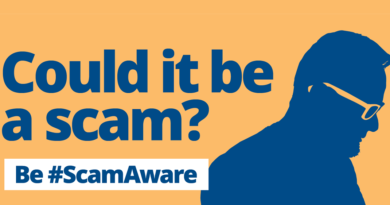The 12 scams of Christmas
Are you running around like a headless chicken turkey, trying to manage all the expectations that Christmas brings this year? With Covid just passing, there’s a good chance you’re considering a right good old blowout, too. Well, don’t let you’re running around reduce your instinct in sniffing out a Christmas scam.
This time of the year, scammers are on every corner. Some of those poor scammers are a little hard-pressed thanks to good old Covid..they are even more desperate to empty your bank account. These scammers are aggressive, intelligent (some!), well-practiced, and organized, so be careful.

Read on dear headless chicken turkey, and hopefully, you’ll slow down your day a little, and gain a sixth sense for sniffing out that Xmas scammer.
Isn’t everything a scam these days?
Scams happen every day. Whether it is a little false advertising, such as buy one, get one-half price (not really half price!), or the little old lady at the end of your street getting calls every day to have her windows double glazed. They’re all scams, at the end of the day! But, Christmas scams are the real low baller, in our eyes. They try and ruin your kid’s day, or your family one big time of the year where you all try and forget what’s going on outside..and just relax.
Nobody has the time to deal with this. Being a scam victim is horrible. Being a scam victim during Christmas is especially horrible, as it usually affects the people around you too.
Scams and Fraud spike by as much as 2% globally on December 24th. E-commerce sales globally, also grew by 15% during the first half of 2021, compared to 2020. Those two factors mean, Christmas, really is Christmas, for those scammers!

The wise shopper will always keep an eye on potential scammers and fraudsters. Phone scams, email scams, letter scams, door-door scams, Xmas tree scams! they are literally everywhere.
How to tell if someone is about to scam you?
There is a basic rule that if a product sounds amazing, genuine, credible, and cheap… it’s most likely a scam. Always keep the sixth sense working, your natural human instinct for danger is always there. Some people just choose to ignore it.
Red flags can be unusual demands, refusals to meet, and asking for personal information. For example, a romance scammer will pretend to have an instant bond with you..then after a few weeks of saying how they want to get married..they ask for a ‘loan’. We have all heard about them, but they are really, really difficult to detect when you are caught up in the moment.
A great way of checking is using a website that records scams and lets you search for literally everything possibly related to a scammer, to check their legitimacy. Scamsearch.io is a great resource to offer such a service. It lets you search millions of known scam email addresses, usernames, crypto addresses, and reported IP addresses. Once more, it also offers advanced reverse searching against scammer profile pictures, product pictures and checks dating sites and social media sites for similar user profiles. A great resource for anyone who dates, shops, or works online! Even online investigators use the service!
So, before you trust something over the phone or through emails, it is better first to analyze and understand who you are talking with. Check the reviews, see how long they have been trading, check for common mistakes on the website (which may indicate a rushed job). Rely on that human instinct.
Use the sixth sense..
We all know what feels dangerous (or dodgy), but we can’t let that control our whole life, I know. Sometimes we can be overly cautious, particularly when we don’t know enough about a situation. Here are some common indicators to keep in the back of your mind when buying:
1) Hey! I’ve not seen you in 10 years!

We usually believe that our emails are confidential, but no, they are not; the fraudsters can easily collect vast databases of email accounts. When we are contacted on our accounts, it can be tempting to think that the person on the other end is trustworthy if the conversation context is friendly and intimate. However, regardless of how harmless the physical communication appears, you should be aware of any unanticipated contact. Scammers build their trust before looting the victims.
A lot of hackers want to gain access to your accounts, so they can run scams to your contact list. If someone in your contacts list contacts you out of the blue..and suddenly wants to show you a website or an ‘amazing deal’, run for the hills!
2) Resist the temptation..its fake
If something appears to be too good to be true, it is undoubtedly a sign that something is up. When someone tries to push you in a situation by making big promises in return for your credentials, it is ideal to step back. Scammers are famous for their “get-rich-quick” schemes. If someone is offering a genuine business or product to you, you need not provide personal information and credentials to use it.

Don’t let temptation make you click the link, buy the product, sign up for the newsletter, or send the money. There is always a catch. Whatever they are having you do, will cost you more than what you are about to receive.
3) Wire transfer is bad.
Wire transfers are simple, and they don’t need any interaction with third parties that take processing fees. However, this simplicity makes it hard to recover your cash in case of a scam. Scammers don’t need to verify their identities if they don’t use a secure platform like PayPal. Hence, it is usually impossible to locate or trace scammers.
Wire transfers and money orders are two perfect examples of classic scams. Scammers may contact individuals on sites like OfferUp and Craigslist. After that, they will ask for a money order to pay them for a product. Scammers take advantage of the fact that money orders are faster to forge than meeting personally. A scammer will submit a fake money order with an amount more than the agreed price only to phone the victim in a hurry and insist that they need to wire transfer the money.
Unaware victims are usually scammed for the difference, and they are left with nothing more than fake money orders.
4) Threats – pay here urgently!!
Threatening scams may be quite scary. In certain circumstances, scammers threaten extortion and try to scare their victims into making a payment. In other circumstances, scammers seek to manipulate their victims. The fact is that many of these attacks are baseless and illegal. If you get cyber threats, notify the proper authorities.
At the time, they can cause a lot of panics. They try to cause alarm and make you feel the only way out is what they are offering. Although you can take comfort in knowing it’s all a bluff. Unless you do something they want you to do, they have nothing on you.
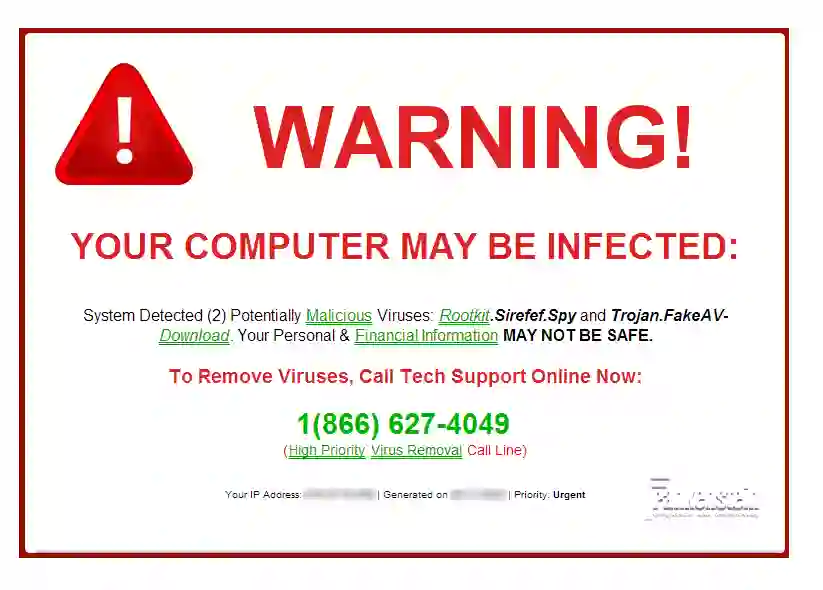
This bluff/threat scam can come in all shapes and sizes, but usually starts with an alarming message, such as ‘we know what you have been doing!’, ‘you are infected’, ‘your IP as been reported!’, etc. Just ignore them and move on with your day, in the knowledge you’re not going to be a statistic, today.
5) “We are the government, pay me now!”
Scammers can act as official government authorities to loot the law-abiding citizens. They can use geolocation data to get details about local governments in your region and use them against you. According to victims, scammers have even created fake email servers in the names of local administration officers and impersonate them. Any federal agency or financial organization with authority will have a physical location and contact information. In case of any urgent concerns, you can phone them!

6) Please help, my monkey needs medication!
Disasters can happen in anyone’s life. Many of us are happy to help needy people. However, any person who contacts you personally and claims to be the victim and needs your help is most likely trying to scam you.
Helping needy people is remarkably safe and transparent when you do it through fundraising sites and relief groups. Never let a scammer take advantage of your helping nature.
They will give you every sob story you can think of. And, to be fair they are quite convincing. They would have tested out the story on thousands of hard-working people, to get the right feeling and sentiment that catches you off guard. If you want to help someone, give advice on where they can go in their local council. Or, send money to a charity of your choice.
Don’t give a random stranger money, just because they have a good story. We can all make stories.
What can a scammer do with the name and email address?
Your name and e-mail address are interlinked to one another, forming the crux of sensitive information. Some of the possible things a scammer can do are:
- Opening bank accounts with your name
- Can apply for credit cards, loans, and state amenities.
- Access online shopping websites and order goods
- Can quickly obtain your contact information
- Can take over all your existing accounts
What to do if a scammer gets your e-mail?

Scammers breach email ids in order to send bogus emails from a recognized email address in the expectation that the recipients would respond. The final purpose may be to persuade these contact data to make donations, provide private information, or click on a link that distributes malware, adware, or a trojan on the targeted computer. What should you do if your account has been hacked? Here are the top 3 measures to take right now to reclaim control of your email, get rid of the scammer, and help safeguard yourself in the long term.
1) Credentials change is mandatory
If you are lucky and the scammer hasn’t logged you out of the account, make sure to change credentials immediately. Change the existing password and make the new password stronger. Change any security questions into something tricky that only you know. Last but not least, two-factor authentication is the essential process of all. To get access to an account, you must generally provide your username and password and a temporary passcode.
2) Put the word out
Inform your co-workers, acquaintances, and relatives who are on your online address book that your account has been compromised. Inform them that any suspicious messages sent from your email should be deleted. Tell them not to open apps, click links, disclose payment information, or transfer cash. It might be awkward to inform your connections that you have been scammed, but the warning may prevent them from succumbing to a scam.
3) Turn on the ‘alert mode’
Scammers may implement alterations to your profile. Which allows them to re-enter it or even to continue scamming others after you regain control of it. Make sure that the settings are up to date and be alert for any alterations in them. Have a complete scammer check by running anti-virus software on your computer.
Now that we have understood the factors determining whether he or she is a scammer, let us analyze some of the significant scams to watch out for during the Christmas season.
The 12 scams of Christmas :
To help your spider-sense this Christmas, we provide you with the top 12 scam tricks that seem to be showing a pattern over 2021. Keep your eyes open, suspect every deal, and use a credit card. Here they are anyway..
1) Holiday Scam – It doesn’t look like the pictures!
Many individuals plan their fantasy summer vacation over the Christmas season, either for themselves or as a gift for a beloved one. Scammers are fully aware of this and will create bogus web pages, advertising, and bundles online that look to be offering you your ideal vacation at a magical price. Several entry points, such as a pop-up or social networks advertisement, lead to malware or full-fledged booking fraud.
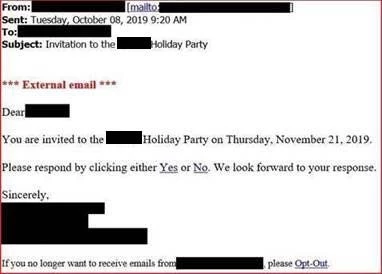
I hear some poor unfortunate souls saying “but it was an advert on Google, it looked genuine enough”, with a sigh. Yes, scammers can place adverts on Google, as easily as good law-abiding organisations can. Google doesn’t know whether the website being advertised, employs ‘dodgy’ trading practices. Just don’t forget, a good Scammer will look as good as a non-scammer. Use reviews, recommendations, and the history of the company in google to check them out first.
There are also a number of websites that let you check if there are public reports of a company scamming customers. These are great as they are populated by other members of the online communities, which means they have no incentive other than helping others and highlighting the scammy company.
2) Fake Job Scam

Thousands of temporary workers are often hired by retailers around the holiday season. Before agreeing to work for anybody, keep an eye out for job scams that are aimed to steal your confidential info, such as Security Numbers and banking information
Quite often they’ll even meet you in person pretend to be the boss. They’ll get copies of all your certificates, IDs, and your bank information to pay you. Then, you won’t hear from them again..but you may get a few maxed credit cards registered to your address…
3) Where is my Wallet?
4) Discount Cards Scams!
Gift cards are a common choice of present for most of us since they are simple to give and can be less expensive than purchasing a given brand as a gift. Scammers are also aware of this and have designed frauds that provide a customer a certificate for a gift card they do not recall receiving. When the user desires to withdraw the gift card purchase, they will be required to provide sensitive information such as credit card details.
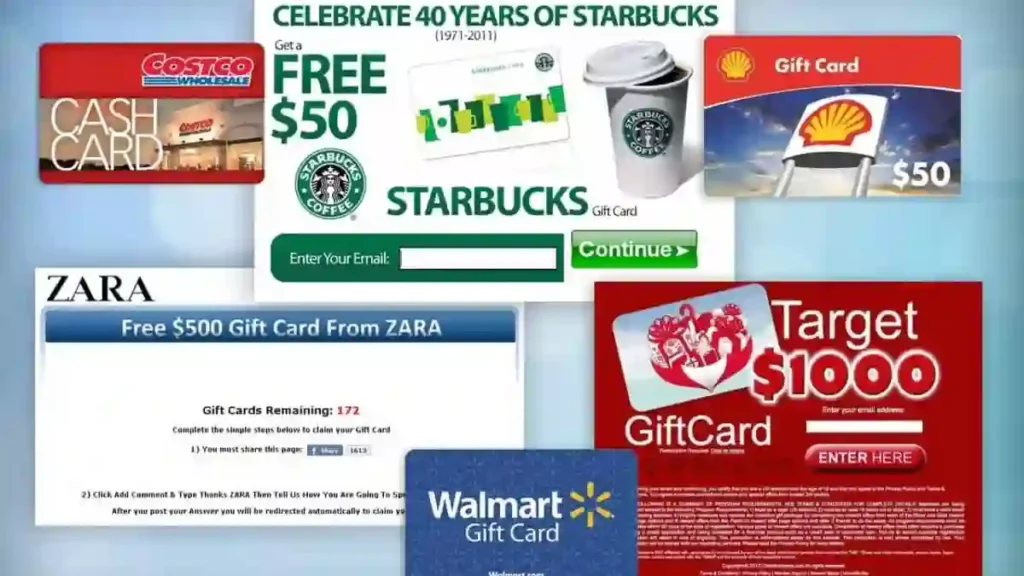
Millions of people are buying these fake gift cards. They don’t seem to be a new trick but the scammers are making them look good, which people presume are therefore genuine. Don’t fall for it!
5) Online gifts for Christmas

When it concerns just finding the perfect present for a loved one, many will go out of their ability to find the lowest version of the merchandise. This primarily implies that you may be purchasing counterfeit goods, but it also signifies that you may be handing your wealth away and obtaining nothing in return. Check to see if the websites you want to purchase from are accurate and that they are safe.
One of the nasty parts of this kind of scam is you don’t often hear from your friends or family if the card was a fake. All they know is it won’t work in the shop. Your friends are quite often too polite to say they did not work, just in case you were strapped for cash!
6) Fake charity scams

A lot of people are keen to provide their contributions to any preferred charity. With most of us spending a lot of time online, organizations are increasingly using social networks and email campaigns to spread the word about their mission and solicit donations. This might pose issues when scammers build fake accounts or websites that appear legitimate and ask for money on behalf of a well-known foundation.
7) Social media scams
Comparable to email distribution, many of us send Christmas cartoons and files to our contacts on social networks to wish them well. Unfortunately, your pals may unintentionally email you spyware. Do not open any attachments or URLs that don’t appear recognizable, even if they come from trustworthy friends and family.
8) E-card scams
During the holiday season, you may get emails and online Christmas cards from unknown senders. Make sure you do not even open any emails or links from someone you don’t know. These ‘Christmas’ gifts may include everything necessary to infiltrate your computer with malware or steal your knowledge and documents.
9) Card reader skimmer scam
Skimmers are little electrical devices that thieves may place over the area where you enter or swipe your bank card. The gadget is used to acquire card details such as your bank details and private information.
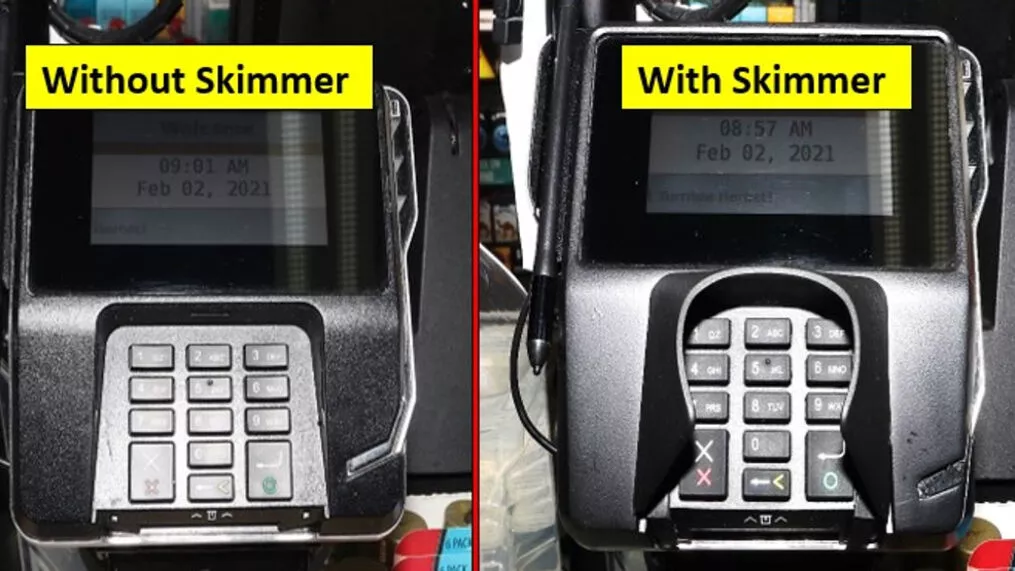
While you chatting to that shop keep about your plans for Xmas, the guy you just handed your card to has disappeared around the back of the shop to ‘get a better signal’. In reality, they are currently cloning your card, to do a little Xmas shopping of their own! Watch what they do, don’t let yourself get distracted by nice smiles.
10) Fake online surveys scams

Throughout the year, fake surveys are distributed that offer a financial reward or present if the user completes the survey. Because most individuals are looking for additional money over the holidays, bogus surveys are on the rise. If a survey asks for your bank or card information, it is most certainly a scam. It’s also uncommon to come across a trustworthy website that legitimately provides cash prizes for survey project completion.
11) Shipping alert scams
Ever seen one of these in your email account? Yup, they are really popular.
Another prevalent email scam over the Christmas season is sending people delivery information for things they did not purchase. Many of us will be anticipating accurate shipment notifications when we place online orders throughout the holiday season. Therefore, there’s a greater possibility that these announcements will be opened and the links will be clicked. When clicked, these URLs may infect your computer or, identical to the gift card scam, may request personal information from the customer, such as bank account information.
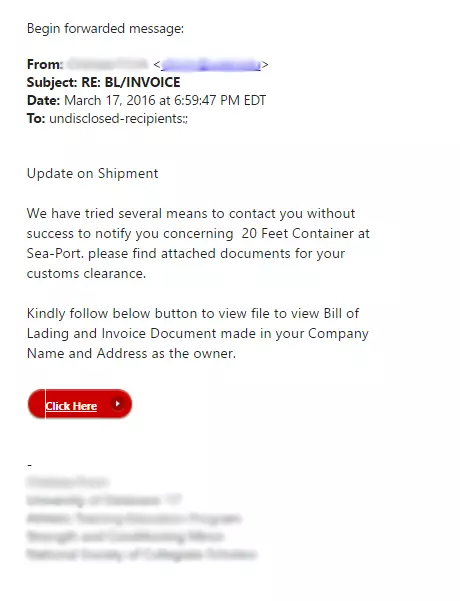
Have a quick look in your spam folder and I bet there are a few in there from today. The really clever ones use your real name and some of them actually quote products that you purchased recently. Always check the sender for any spelling mistakes or weird extensions are the .com in the email address. If you are still unsure, click the ‘source’ button, pull out the details and see what you can find out on the email address itself and the IP of the server it came from.
12) WiFi scams

This is another sneaky one, that’s hugely popular during all major shopping seasons. You go shopping for the day, pop into a cafe for a perk-me-up. Connect to what you think is the Cafe’s free Wifi, and order some amazon small gifts you couldn’t find in the shopping centre. Saved yourself a bit of time.
However, there is a guy in the corner that’s using his laptop as a free WiFi connection for you. He’s mopping up details of all the pages you visit, the bank information you just used, email, password..the lot. If he’s good, he’s just picked up your text authorization code to keep hackers out!
It doesn’t matter how good your security is. If you’re accessing the internet via a scammed route, you might as well walk up to this dude, hand him your wallet, shoes, and socks, and wish him a Merry Xmas! Don’t believe me? google ‘Man-in-the-middle attack’.
Always check with the Cafe what the exact name of the Wifi SSID (name) is, and be suspicious if it does not need a password.
Relax. Just Don’t get distracted & keep your eye open.
Now, it is evident that scammers are inventing new ways to take advantage of you’re hard-earned money, every day. Just listen to our advice, keep your eyes open (and suspect everyone!) and you’ll be fine.
What you can also do is use our website to check if someone or something has been reported as a scam, for free. You can check emails, usernames, names, phone numbers, even pictures, and IP addresses! Just head over to our main page and check them out.
On the other hand, if you’ve read this and just realized you’ve been scammed, among all the other things you now need to do, report them here and help other people from falling for the same trick!
If you REALLY want to stay safe online, you can buy our premium reports package and constantly monitor someone to see if they ever slip up and report them to the authorities. We also offer a FREE trial of these advanced searches, just so you can see how great they really are. Just sign up and you’ll get two search credits free, no catches!
Have you found this article useful? Then perhaps you want to check out these or follow us on Twitter:
- Hidden Profiles: How to do a Reverse Image Search?
- The 12 scams of Christmas 2021
- Good vs Evil : Hidden Worlds Of Scam Baiting, Scams & Scammers
- How To Protect Yourself from Scammers?
- 11 Ways to outsmart a romance scammer
- Phone Scammers : How Do You Know if their scammers?

